2018年11月浙江高考英语真题(word版附答案)
2018年浙江省高考英语试卷(含详细答案解析)
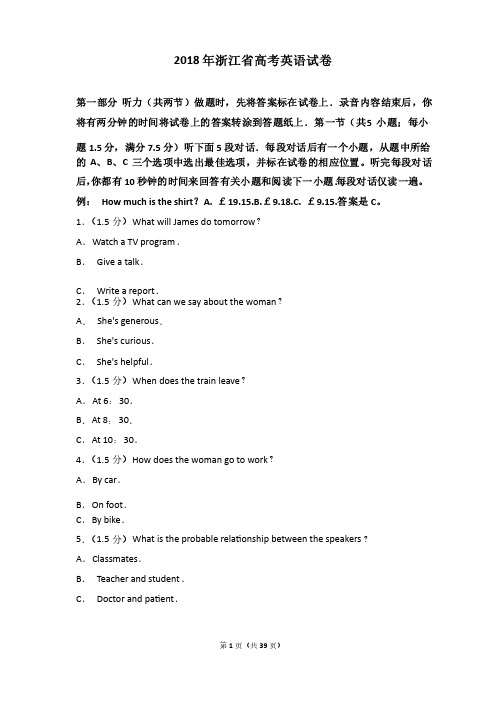
第二部分 阅读理解(共两节)第一节(共10 个小题;每小题2.5 分,满分 25.0 分)阅读下列短文,从每题所给的A、B、C 和 D 四个选项中,选出最佳选项, 并在答题纸上将该项涂黑.
(1)Which of the following best deseribes Bri sh novels in the 18th century ? A. They were difficult to understand . B. They were popular among the rich. C. They were seen as nearly worthless. D. They were wri en mostly by women .
第二节(每小题 1.5 分,满分 22.5 分)听下面 5 段对话或独白.每段对话或独 白后有几个小题,从题中所给的A、B、C 三个选项中选出最佳选项,并标在试 卷的相应位置.听每段对话或独白前,你将有时间阅读各个小题,每小题5 秒 钟;听完后,各小题给出5 秒钟的作答时间.每段对话或独白读两遍.
(2)What is the man doing for the woman? A.Looking for some local foods. B.Showing her around the seaside. C.Offering informa on about a hotel . 8.(4.5 分)听第 8 段材料,回答下列各题. (1)Where does the conversa on probably take place ? A. In an office.
2018年11月浙江高考英语真题[word版附答案]
![2018年11月浙江高考英语真题[word版附答案]](https://img.taocdn.com/s3/m/bac5fcecaa00b52acfc7ca33.png)
2018年11月浙江高考英语真题(word版附答案)2018年下半年普通高等学校招生全国统一考试英语本试题卷分选择题和非选择题两部分。
全卷共12页,选择题部分1至9页,非选择题部分10至12页。
满分150分,考试时间120分钟。
考生注意:1.答题前,请务必将自己的姓名、准考证号用黑色字迹的签字笔或钢笔分别填写在试题卷和答题纸规定的位置上。
2.答题时,请按照答题纸上“注意事项”的要求,在答题纸相应的位置上规范作答,在本试题卷上的作答一律无效。
选择题部分第一部分听力(共两节,满分30分)做题时,先将答案标在试卷上。
录音内容结束后,你将有两分钟的时间将试卷上的答案转涂到答题纸上。
第一节(共5小题;每小题1.5分,满分7.5分)听下面5段对话。
每段对话后有一个小题,从题中所给的A、B、C三个选项中选出最佳选项,并标在试卷的相应位置。
听完每段对话后,你都有10秒钟的时间来回答有关小题和阅读下一小题。
每段对话仅读一遍。
1.What does the woman want to do?A.Watch TV.B.Go for a walk.C.Access the Internet.2.Why would the woman like to have a Chinese name?A.She is taking a Chinese class.B.She will be working in China.C.She has made some Chinese friends.3.What are the speakers talking about?A.A travel plan.B.An exam result.C.A sports game.4.What has the man been doing?A.Writing something.B.Repairing his pen.C.Shopping.5.What does John suggest the woman do?A.Meet his friend.B.Ask Harry for help.C.Go to the airport with him.第二节(共15小题;每小题1.5分,满分22.5分)听下面5段对话或独白。
浙江201811月高考英语试题[含答案解析]
![浙江201811月高考英语试题[含答案解析]](https://img.taocdn.com/s3/m/eca0637883d049649a6658ab.png)
浙江省2017年H^一月英语高考试题听力部分:ACBCB/ CBABC / ACBAB / AABCA 阅读理解:AWhen I was in fourth grade, I worked part-time as a paperboy. was one of my customers.She'd watch me coming down her street, and by the time I'd biked up to her doorstep, there'd be a cold drink waiting. I'd sit and drink while she talked.talked mostly about her dead husband, "Mr. Stanley and I went shopping this morning." she'd say. The first time she said that, soda(汽水)went up my nose.I told my father how Mrs. Stanley talked as if Mr. Stanley were still alive. Dad said she was probably lonely, and that I ought to sit and listen and nod my head and smile, and maybeshe'd work it out of her system. So that's what I did, and it turned out Dad was right. After a while she seemed content to leave her husband over at the cemetery(墓地).I finally quit delivering newspapers and didn't see Mrs. Stanley for several years. Then we crossed paths at a church fund-raiser(募捐活动).She was spooning mashed potatoes and looking happy. Four years before, she'd had to offer her paperboy a drink to have someone to talk with. Now she had friends. Her husband was gone, but life went on.I live in the city now, and my paperboy is a lady named Edna with three kids.She asks me how I'm doing. When I don't say "fine", she sticks around to hear my problems. She's lived in the city most of her life, but she knows about community.Community isn't so much a place as it is a state of mind. You find it whenever people ask howyou're doing because they care, and not because they're getting paid to doso. Sometimes it's good to just smile, nod your head and listen.21. Why did soda go up the author's nose one timeA. He was talking fast.B. He was shocked.C. He was in a hurry.D. He was absent-minded.22. Why did the author sit and listen to Mrs. Stanley according to Paragraph 3A. He enjoyed the drink.B. He wanted to be helpful.C. He took the chance to rest.D. He tried to please his dad.23. Which of the following can replace the underlined phrase "work it our of her system"A. recover from her sadnessB. move out of the neighborhoodC. turn to her old friendsD. speak out about her past24. What does the author think people in a community should do A. Open up to others. B. Depend on each other.C. Pay for other's helpD. Care about one another.BIt's surprising how much simple movement of the body can affect the way we think. Usingexpansive gestures with open arms makes us feel more powerful, crossing your arms makes you more determined and lying down can bring more insights(领悟).So if moving the body can have these effects, what about the clothes we wear We're all well aware of how dressing up in different ways can make us feel more attractive, sporty or professional, depending on the clothes wewear, but can the clothes actually change cognitive (认知)performance or is it just a feelingAdamand Galinsky tested the effect of simply wearing a white lab coat on people's powers of attention. The idea is that white coats are associated with scientists, who are in turn thought to have close attention to detail.What they found was that people wearing white coats performed better than those who weren't. Indeed, they made only half as many errors as those wearing their own clothes on the Stroop Test(one way of measuing attention). The reserchrs call the effect "enclothed cognition," suggesting that all manner of different clothes probably affect our cognition in many differnt ways.This opens the way for all sorts of clothes-based experiments. Is the writer who wears a fedora more creative Is the psychologist wearing little round glasses and smoking a cigar moreinsightful Does a chef's hat makethe restaurant food taste better From now on I will only be editing artcles for PsyBlog while wearing a white coat to help keep the typing error count low. Hopefully you will be doing your part by reading PsyBlog in a cap and gown(学位®).25. What is the main idea of the textA. Body movements change the way people think.B. How people dress has an influencee on their feelings.C. What people wear can affect their cognitive performance.D. People doing different jobs should wear different clothes.26. Adam and Galinsky's experiment tested the effect of clothes on their wearers'.A. insightsB. movementsC. attentionD. appearance27. How does the author sound in the last paragraphA. Academic.B. Humorous.C. Formal.D. Hopeful.CThere are energy savings to be made from all recyclable materials, sometimes huge savings. Recycling plastics and aluminum, for instance, uses only 5% to 10% as much energy as producing new plastic or smelting (提炼)aluminum.Long before most of us even noticed what we now call "the environment," Buckminster Fuller said, "Pollution is nothing but the resources (资源)we are not harvesting. We allow them to be left around because we've been ignorant of their value." To takeone example, let's compare the throwaway economy (经济)with a recycling economy as we feed a cat for life.Say your cat weigh 5kg and eats one can of food each day. Each empty can of its food weights 40g. In a throwaway economy, you would throw away 5,475 cans over the cat's 15-year lifetime. That's 219kg of steel-more than a fifth of a ton and more than 40 times the cat's weight.In a recycling economy, we would makeone set of 100 cans to start with, then replace them over and over again with recycled cans. Since almost 3% of the metal is lost during reprocessing, we'd have to make an extra 10 cans each year. But in all, only 150 cans will be used up over the cat's lifetime-and we'll still have 100 left over for the next cat.Instead of using up 219kg of steel, we've used only 6kg. And because the process of recycling steel is less polluting than making new steel, we've also achieved the following significant savings: in energy use-47% to 74%; in air pollution-85%; in water pollution-35%; in water use-40%.28. What does Buckminster Fuller say about pollutionA. It is becoming more serious.B. It destroys the environment.C. It benefits the economy.D. It is the resources yet to be used.29. Howmany cans will be used up in a cat's 15-year lifetime in a recycling economy A. 50 B. 100C. 150D. 25030. What is the author's purpose in writing the textA. To promote the idea of recycling.B. To introduce an environmentalist.C. To discuss the causes of pollution.D. To defend the throwaway economy.How to Remember What You ReadReading is important. But the next step is making sure that you remember what you've read!__31__you may have just read the text. But the ideas, concepts and images(形象)may fly right out of your head. Here are a few tricks for remembering what you read. ・__32__If the plot, characters, or word usage is confusing for you, you likely won't be able to remember what you read. It's a bit like reading a foreign language. If you don't understand what you're reading, how would you rememberit But there are a few things you can do... Use a dictionary; look up the difficult words.• Are you connectedDoes a character remind you of a friend Does the setting make you want to visit theplace Does the book inspire you, and make you want to read more With some books, you mayfeel a connection right away. __33__ Howwilling are you to makethe connections happen・ Read it; hear it; be it!Read the lines. Then, speak them out loud. And, put some character into the words. When he was writing his novels, Charles Dickens would act out the parts of the characters. He'd make faces inthe mirror, and change his voice for each character. __34__• How often do you readIf you read frequently, you'll likely have an easier time with remembering what you' re reading and what you've read. __35__As you make reading a re gular part of your life, you'll make more connections, stay more focused and understand the text better. You ' ll learn to enjoy literature - as you remember what you read!A. Are you confusedB. Practice makes perfect.C. What's your motivationD. Memory is sometimes a tricky thing.E. Marking helps you remember what you read.F. But other books require a bit more work on your part.G. You can do the same thing when you are reading the text! 31-35 DAFGB 完型填空A young English teacher saved the lives of 30 students when he took__36__ of a bus after its driver suffered a serious heart attack. Guy Harvold,24, had __37__ the students and three course leaders from Gatwick airport, and they were travelling to Bourme mouth to __38__ their host families. They were going to __39__ a course at the ABC Language School in Bournemouth where Harvold works as a __40__.Harvold, who has not __41__ his driving test, said, "I realized the bus was out of control when I was __42__ the students." The bus ran into trees at the side of the road and he __43__the driver was slumped(倒伏)over the wheel. The driver didn't __44__. He was unconscious. Thebus__45__ a lamp post and it broke the glass on the front door before Harvold __46__ to bring the bus to a stop. Police__47__ the young teacher's quick thinking. If he hadn't __48__ quickly, there could have been a terrible__49__.The bus driver never regained consciousness and died at Easy Surrey Hospital. He had worked regulary with the __50__ and was very well regarded by the teachers and students. Harvold said, "I was __51__ that no one else was hurt, but I hoped that the driver would __52__.The head of the language school told the local newspaper that the school is going to send Harvold on a weekend __53__ to Dublin with a friend, thanking him for his __54__. A local driving school has also offered him six __55__driving lessons. 36. A. control B. care C. advantage D. note37. A. taken in B. picked up C. tracked down D. helped out38. A. greet B. thank C. invite D. meet39. A. present B. introduce C. take D. organize40. A. drive B. doctor C. librarian D. teacher41. A. given B. marked C. passed D. conducted42. A. speaking to B. waiting for C. returning to D. looking for43. A. learned B. noticed C. mentioned D. doubted44. A. sleep B. cry C. move D. recover45. A. ran over B. went by C. carried D. hit46. A. remembered B. continued C. prepared D. managed47. A. witnessed B. recorded C. praised D. understood48. A. appeared B. reacted C. escaped D. interrupted49. A. delay B. accident C. mistake D. experience50. A. airport B. hospital C. school D. police51. A. happy B. fortunate C. touched D. sorry52. A. survive B. retire C. relax D.succeed53. A. project B. trip C. dinner D. duty54. A. bravery B. skill C. quality D. knowledge55. A. necessary B. easy C. different D. free语法填空Easy Ways to Build VocabularyIt's not all that hard to build an advanced and large vocabulary. Like many things in life, it's__56__ongoing process, and the best part of the process is that there's enough room for improvement, __57__means you'll just keep getting better and better. Of course you have to work at it. You wouldn't think that a few__58__(month) of exercise in your teens would be enough __59__ the rest of your life, and that's also true for building your vocabulary--you have to keep at it daily, and pretty soon you will find that you have an excellent vocabulary.One of the __60__(effect) ways to build vocabulary is to read good books. You need to __61__(real)read at least one good book a week, preferably a classic. This isn't as hard as it __62__(sound), and it is far better than any other method because you improve your vocabulary while __63__(read) an interesting piece of literature. Another nice thing is that you learn both new words and __64__(they) use unconsciously, meaning that you will tend to use the words __65__(learn) this way in conversations almost automatically.参考答案56. an 57. which 58. months59. for 60. most effective 61. really 62. sounds 63. reading64. their ( 后面的use是名词)65. learned ( 过去分词作后置定语修饰words)【应用文写作】假如你是李华,你们学校的外教Mr. Hall寒假不回国。
(精校版)2018年浙江英语高考试题文档版(含答案)
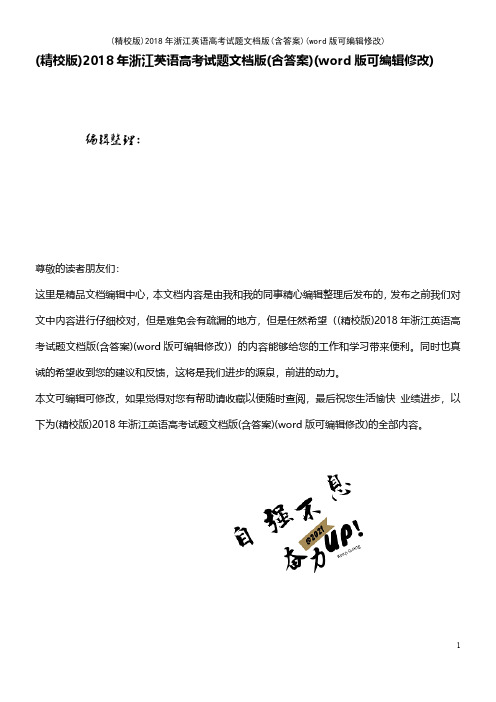
(精校版)2018年浙江英语高考试题文档版(含答案)(word版可编辑修改)编辑整理:尊敬的读者朋友们:这里是精品文档编辑中心,本文档内容是由我和我的同事精心编辑整理后发布的,发布之前我们对文中内容进行仔细校对,但是难免会有疏漏的地方,但是任然希望((精校版)2018年浙江英语高考试题文档版(含答案)(word版可编辑修改))的内容能够给您的工作和学习带来便利。
同时也真诚的希望收到您的建议和反馈,这将是我们进步的源泉,前进的动力。
本文可编辑可修改,如果觉得对您有帮助请收藏以便随时查阅,最后祝您生活愉快业绩进步,以下为(精校版)2018年浙江英语高考试题文档版(含答案)(word版可编辑修改)的全部内容。
绝密★启用前2018年6月普通高等学校招生全国统一考试(浙江卷)英语选择题部分第一部分听力(共两节,满分30分)做题时,先将答案标在试卷上。
录音内容结束后,你将有两分钟的时间将试卷上的答案转涂到答题纸上。
第一节(共5小题;每小题1。
5分,满分7。
5分)听下面5段对话。
每段对话后有一个小题,从题中所给的A、B、C三个选项中选出最佳选项,并标在试卷的相应位置。
听完每段对话后,你都有10秒钟的时间来回答有关小题和阅读下一小题。
每段对话仅读一遍。
学@科网1。
What will James do tomorrow?A。
Watch a TV program。
B。
Give a talk。
C。
Write a report。
2. What can we say about the woman?A。
She’s generous.B。
She’s curious。
C. She's helpful.3. When does the train leave?A. At 6:30。
B. At 8:30。
C。
At 10:30。
4。
How does the woman go to work?A. By car。
【真题】2018年浙江省高考英语试题含答案解析(Word版)
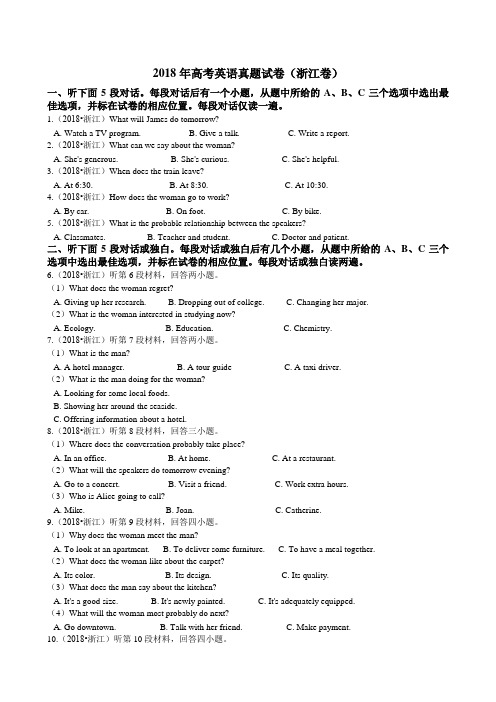
2018年高考英语真题试卷(浙江卷)一、听下面5段对话。
每段对话后有一个小题,从题中所给的A、B、C三个选项中选出最佳选项,并标在试卷的相应位置。
每段对话仅读一遍。
1.(2018•浙江)What will James do tomorrow?A. Watch a TV program.B. Give a talk.C. Write a report.2.(2018•浙江)What can we say about the woman?A. She's generous.B. She's curious.C. She's helpful.3.(2018•浙江)When does the train leave?A. At 6:30.B. At 8:30.C. At 10:30.4.(2018•浙江)How does the woman go to work?A. By car.B. On foot.C. By bike.5.(2018•浙江)What is the probable relationship between the speakers?A. Classmates.B. Teacher and student.C. Doctor and patient.二、听下面5段对话或独白。
每段对话或独白后有几个小题,从题中所给的A、B、C三个选项中选出最佳选项,并标在试卷的相应位置。
每段对话或独白读两遍。
6.(2018•浙江)听第6段材料,回答两小题。
(1)What does the woman regret?A. Giving up her research.B. Dropping out of college.C. Changing her major.(2)What is the woman interested in studying now?A. Ecology.B. Education.C. Chemistry.7.(2018•浙江)听第7段材料,回答两小题。
201811月浙江高考英语试题答案解析及解析
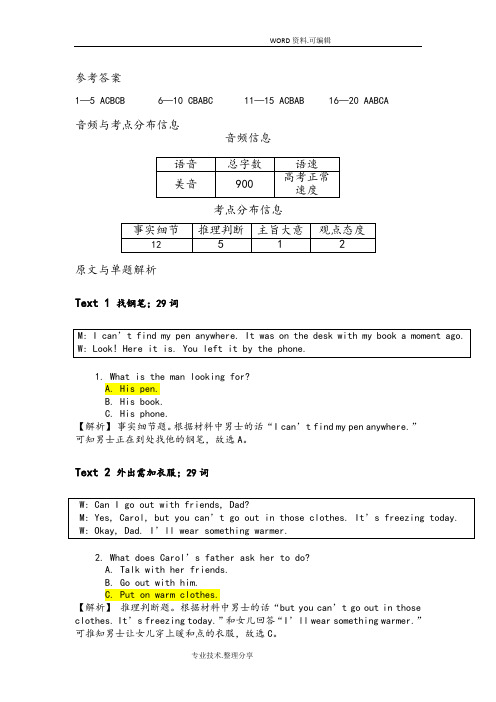
参考答案1—5 ACBCB 6—10 CBABC 11—15 ACBAB 16—20 AABCA音频与考点分布信息音频信息考点分布信息原文与单题解析Text 1 找钢笔;29词1. What is the man looking for?A. His pen.B. His book.C. His phone.【解析】事实细节题。
根据材料中男士的话“I can’t find my pen anywhere.”可知男士正在到处找他的钢笔,故选A。
Text 2 外出需加衣服;29词2. What does Carol’s father ask her to do?A. Talk with her friends.B. Go out with him.C. Put on warm clothes.【解析】推理判断题。
根据材料中男士的话“but you can’t go out in those clothes. It’s freezing today.”和女儿回答“I’ll wear something warmer.”可推知男士让女儿穿上暖和点的衣服,故选C。
Text 3 研究小组的人数;22词3. How many members are there in Alice’s group now?A. Two.B. Four.C. Six.【解析】事实细节题。
根据材料中女士的话“there were six of us to begin with. Then two people left.”可以简单地计算出女士的小组现在有4名成员,故选B。
Text 4 让孩子在厨房帮忙;40词4. What are the speakers talking about?A. Ways of cooking.B. Healthy food for kids.C. Kids helping in the kitchen.【解析】主旨大意题。
2018年11月浙江高考英语试题和答案(含听力原文)
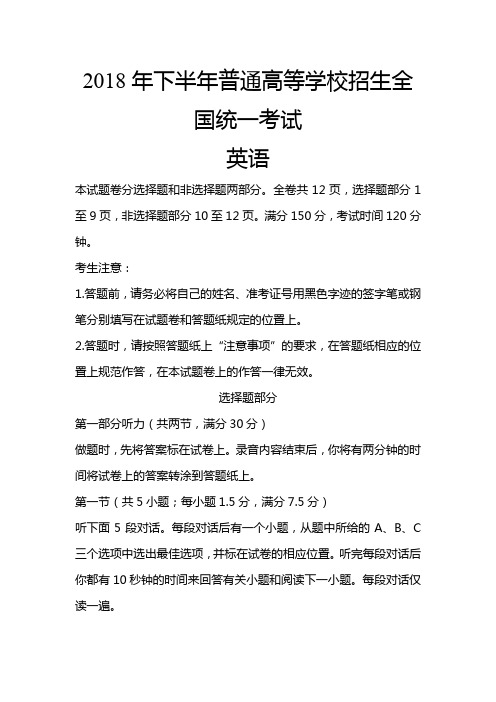
2018年下半年普通高等学校招生全国统一考试英语本试题卷分选择题和非选择题两部分。
全卷共12页,选择题部分1至9页,非选择题部分10至12页。
满分150分,考试时间120分钟。
考生注意:1.答题前,请务必将自己的姓名、准考证号用黑色字迹的签字笔或钢笔分别填写在试题卷和答题纸规定的位置上。
2.答题时,请按照答题纸上“注意事项”的要求,在答题纸相应的位置上规范作答,在本试题卷上的作答一律无效。
选择题部分第一部分听力(共两节,满分30分)做题时,先将答案标在试卷上。
录音内容结束后,你将有两分钟的时间将试卷上的答案转涂到答题纸上。
第一节(共5小题;每小题1.5分,满分7.5分)听下面5段对话。
每段对话后有一个小题,从题中所给的A、B、C 三个选项中选出最佳选项,并标在试卷的相应位置。
听完每段对话后你都有10秒钟的时间来回答有关小题和阅读下一小题。
每段对话仅读一遍。
1.What does the woman want to do?A.Watch TV.B.Go for a walk.C.Access the Internet.2.Why would the woman like to have a Chinese name?A.She is taking a Chinese class.B.She will be working in China.C.She has made some Chinese friends.3.What are the speakers talking about?A.A travel plan.B.An exam result.C.A sports game.4.What has the man been doing?A.Writing something.B.Repairing his pen.C.Shopping.5.What does John suggest the woman do?A.Meet his friend.B.Ask Harry for help.C.Go to the airport with him.第二节(共15小题;每小题1.5分,满分22.5分)听下面5段对话或独白。
2018年11月浙江省高考英语真题听力试题(附听力音频+答案+文本)
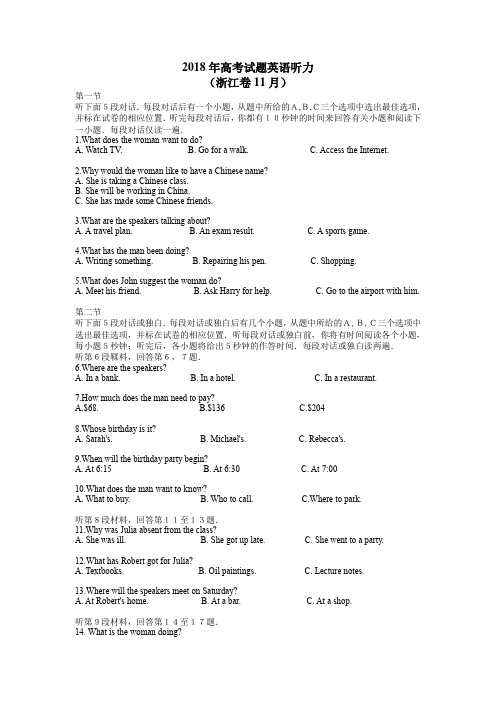
2018年高考试题英语听力(浙江卷11月)第一节听下面5段对话.每段对话后有一个小题,从题中所给的A,B,C三个选项中选出最佳选项,并标在试卷的相应位置.听完每段对话后,你都有10秒钟的时间来回答有关小题和阅读下一小题.每段对话仅读一遍.1.What does the woman want to do?A. Watch TV.B. Go for a walk.C. Access the Internet.2.Why would the woman like to have a Chinese name?A. She is taking a Chinese class.B. She will be working in China.C. She has made some Chinese friends.3.What are the speakers talking about?A. A travel plan.B. An exam result.C. A sports game.4.What has the man been doing?A. Writing something.B. Repairing his pen.C. Shopping.5.What does John suggest the woman do?A. Meet his friend.B. Ask Harry for help.C. Go to the airport with him.第二节听下面5段对话或独白.每段对话或独白后有几个小题,从题中所给的A,B,C三个选项中选出最佳选项,并标在试卷的相应位置.听每段对话或独白前,你将有时间阅读各个小题,每小题5秒钟;听完后,各小题将给出5秒钟的作答时间.每段对话或独白读两遍.听第6段鞣料,回答第6,7题.6.Where are the speakers?A. In a bank.B. In a hotel.C. In a restaurant.7.How much does the man need to pay?A.$68.B.$136C.$2048.Whose birthday is it?A. Sarah's.B. Michael's.C. Rebecca's.9.When will the birthday party begin?A. At 6:15B. At 6:30C. At 7:0010.What does the man want to know?A. What to buy.B. Who to call.C.Where to park.听第8段材料,回答第11至13题.11.Why was Julia absent from the class?A. She was ill.B. She got up late.C. She went to a party.12.What has Robert got for Julia?A. Textbooks.B. Oil paintings.C. Lecture notes.13.Where will the speakers meet on Saturday?A. At Robert's home.B. At a bar.C. At a shop.听第9段材料,回答第14至17题.14. What is the woman doing?A. Attending a seminar.B. Giving some advice.C. Doing an interview.15.How often does the man travel by bus?A. Twice a day.B. Every other day.C. Once a week.16.How does the mann feel about the bus service?A. It's good.B. It's fair.C. It's poor.17.What improvement should the bus company make?A. Buses should be more punctual.B. Drivers should be more polite.C. Seats should be more comfortable.听第10段材料,回答第18至20题.18. Who is Pierre?A. A doctor from Senegal.B. A university researcher.C. A United Nations official.19.What does Pierre mainly talk about?A. Food supplies in the world.B. The role that the UN plays.C. The purpose of his study.20.What is the expected outcome of Pierre's work?A. A new medicine.B. A new type of rice.C. A new farming method.自助获取听力音频答案:1-5 CBCAB6-10 BAACC11-15 ACBCA16-20 BABCB文本:Text 1W:The Internet is down again. Oh,what can I do?M:You can read a book,watch TV, take a walk...There are a lot of things to do.W:I don't mean that. I mean,how can I reconnect to it?down:停机的Text 2W:Brad, I've got this list of Chinese names here. Could you help me pick one?M:So, you're serious about having a Chinese name for your job in China?W:Yes.Two of my friends in the team have already got theirs.Text 3W:What's the score now?M:It's 3-2 at the moment in England's favor,but Spain seems to be taking the upper hand on the field.Text 4M:Oops!My pen is out of ink. I haven't finished yt.W:You can borrow mine.M:Thank you.I'll buy a new one tomorrow.Text 5W:John,could you give me a lift home this evening? My car is at the garage.M:I'd love to help you,but I promised to meet someone at the airport after work.Harry goes your way,though. Why don't you ask him?Text 6W:Good afternoon,Sir. Can I help you?M:Yes,we need a room for the night. Have you got any rooms available?W:Yes.Would you like a single room or a double room?M:A double room.W:How many nights would you like to stay?M:We're only staying overnight. We'll check out tomorrow morning. How much is it?W:It's $68 per night.M:OK. Do you accept credit cards?W:Yes,we do. Now,your room number is 204. Here is the key.M:Thank you.Text 7W:Michael,what time is it? We are going to be late for the party.M:It's 6:15. Don't worry, Rebecca.We will be fine.W:But we have to be at Sarah's house by 6:30 for her surprise birthday party. The traffic is getting heavier.M:Relax.The party starts at 7:00. We are not far from her house now.But I do need help with finding a place to park the car so Sarah doesn't see it. Can you phone her husband and ask him where it is best to park our car?W:OK.I'm calling him now.Text 8M:Hi Julia,it's Robert.How are you?I didn't see you in class today, and I wondered if you were all right.W:Oh yes.I'm better now.But I decided to take the day off, as I woke up with a slight cold.It's really so nice you called.M:Julia,I got you a copy of the main points of the lecture.It was just an introduction to French impressionist paintings.W:I see.I can read it then,before the next class.M:Uh,Julia...I'm calling as I wonder if you are free on Saturday night. My friend Max is having a party,and I'd like to know if you want to go.W:That would be really nice. I'll be free then. What time shall we go?M:How about meeting in the student union bar at seven o'clock?W: That'll be fine. But shouldn't we buy a present for Max?M:Well,we can stop at a gift shop on the way.W:Fine.I'll see you then.Text 9W:Excuse me.I'm doing research on bus service.Could I get you to answer a few questions?It won't take long.M:OK.I'd like to help.W:Thanks.How often do you take a bus --every day,lessl than once a week,or somewhere in between?M:I go to school by bus,so it's usually twice daily -- Line 4.W:I see.Could you rate its service?If one is poor,two is fair,and three is good, which number would you choose?M:I would say two.The drivers are nice,the buses are clean, and the seats are comfortable.But it's sometimes unreliable.There should be a bus every 10 minutes.But yesterday morning,I waited almost 20 minutes before the bus came and was almost late for school.W:Oh,that's too bad. Do you have some suggestions for the bus company?M:Try to have the buses arrive on time,of course.And,um...there can be a map on the bus. You know,some passengers cannot use the guidebook very well.W:Thank you very much for your help.M:You're welcomeText 10Hello,everyone.It is indeed a great pleasure to have this chance to address such a large audience this evening.I'm Pierre Chabreau(Marsay)from the University of Marseille (shublaw). At the moment,I'm carrying out research in Senegal for the United Nations, as part of a project to increase world food production. Before I get on to (开始谈论)what exactly we did in our research, I would like to explain briefly the purpose behind it. Quite simply,my subject is rice.As you all know,rice is the main food for millions of people in the world.So,if rice crops fail,millions of people starve and die.And they do fail,very often through disease.Now,what my colleagues and I have been doing out in the field in Senegal,as well as in the university laboratories,is to try to produce a disease-resisting variety of rice , a particular kind of rice which will resist disease, in other words,a stronger type of rice.。
2018年11月浙江高考英语真题(word版附答案)-(8320)

2018 年11 月浙江高考英语真题(word 版附答案)2018年下半年普通高等学校招生全国统一考试英语本试题卷分选择题和非选择题两部分。
全卷共12 页,选择题部分 1 至9 页,非选择题部分10 至12 页。
满分150 分,考试时间120 分钟。
考生注意:1.答题前,请务必将自己的姓名、准考证号用黑色字迹的签字笔或钢笔分别填写在试题卷和答题纸规定的位置上。
2.答题时,请按照答题纸上“注意事项”的要求,在答题纸相应的位置上规范作答,在本试题卷上的作答一律无效。
选择题部分第一部分听力(共两节,满分30 分)做题时,先将答案标在试卷上。
录音内容结束后,你将有两分钟的时间将试卷上的答案转涂到答题纸上。
第一节(共 5 小题;每小题 1.5 分,满分7.5 分)听下面 5 段对话。
每段对话后有一个小题,从题中所给的 A 、B、C 三个选项中选出最佳选项,并标在试卷的相应位置。
听完每段对话后,你都有10 秒钟的时间来回答有关小题和阅读下一小题。
每段对话仅读一遍。
1.What does the woman want to do?A.Watch TV.B.Go for a walk.C.Access the Internet.2.Why would the woman like to have a Chinese name?A.She is taking a Chinese class.B.She will be working in China.C.She has made some Chinese friends.3.What are the speakers talking about?A.A travel plan.B.An exam result.C.A sports game.4.What has the man been doing?A.Writing something.B.Repairing his pen.C.Shopping.5.What does John suggest the woman do?A.Meet his friend.B.Ask Harry for help.C.Go to the airport with him.第二节(共15 小题;每小题 1.5 分,满分22.5 分)听下面 5 段对话或独白。
2018年度11月浙江英语高考卷精选题及其规范标准答案

2018年11月浙江省高考英语真题第一部分听力(共两节,满分30分)做题时,先将答案标在试卷上。
录音内容结束后,你将有两分钟的时间将试卷上的答案转涂到答题纸上。
第一节(共5小题;每小题1.5分,满分7.5分)听下面5段对话。
每段对话后有一个小题,从题中所给的A、B、C 三个选项中选出最佳选项,并标在试卷的相应位置。
听完每段对话后,你都有10秒钟的时间来回答有关小题和阅读下一小题。
每段对话仅读一遍。
例: How much is the shirt?A. £19.15.B. £9.18.C. £9.15.答案是C。
1. What does the woman want to do?A. Watch TV.B. Go for a walk.C. Access the Internet.2. Why would the woman like to have a Chinese name?A. She is taking a Chinese class.B. She will be working in China.C. She has made some Chinese friends.3. What are the speakers talking about?A. A travel plan.B. An exam result.C. A sports game.4. What has the man been doing?A. Writing something.B. Repairing his pen.C. Shopping.5. What does John suggest the woman do?A. Meet his friend.B. Ask Harry for help.C. Go to the airport with him.第二节(共15小题;每小题1.5分,满分22.5分)听下面5段对话或独白。
(完整word版)2018年11月浙江高考英语真题(word版附答案)
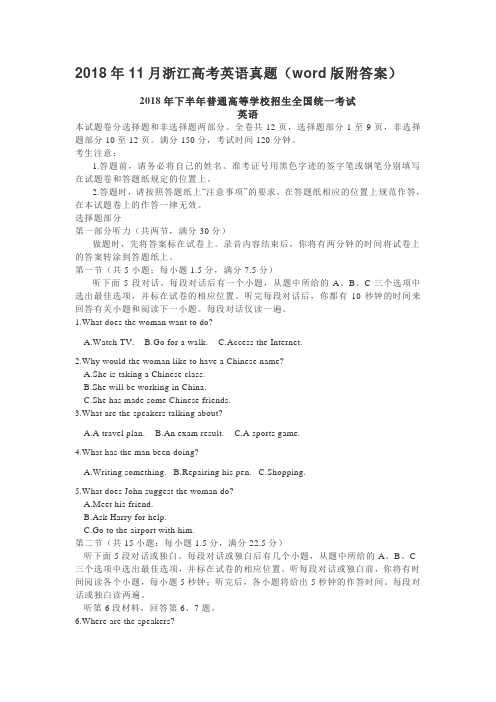
2018年11月浙江高考英语真题(word版附答案)2018年下半年普通高等学校招生全国统一考试英语本试题卷分选择题和非选择题两部分。
全卷共12页,选择题部分1至9页,非选择题部分10至12页。
满分150分,考试时间120分钟。
考生注意:1.答题前,请务必将自己的姓名、准考证号用黑色字迹的签字笔或钢笔分别填写在试题卷和答题纸规定的位置上。
2.答题时,请按照答题纸上“注意事项”的要求,在答题纸相应的位置上规范作答,在本试题卷上的作答一律无效。
选择题部分第一部分听力(共两节,满分30分)做题时,先将答案标在试卷上。
录音内容结束后,你将有两分钟的时间将试卷上的答案转涂到答题纸上。
第一节(共5小题;每小题1.5分,满分7.5分)听下面5段对话。
每段对话后有一个小题,从题中所给的A、B、C三个选项中选出最佳选项,并标在试卷的相应位置。
听完每段对话后,你都有10秒钟的时间来回答有关小题和阅读下一小题。
每段对话仅读一遍。
1.What does the woman want to do?A.Watch TV.B.Go for a walk.C.Access the Internet.2.Why would the woman like to have a Chinese name?A.She is taking a Chinese class.B.She will be working in China.C.She has made some Chinese friends.3.What are the speakers talking about?A.A travel plan.B.An exam result.C.A sports game.4.What has the man been doing?A.Writing something.B.Repairing his pen.C.Shopping.5.What does John suggest the woman do?A.Meet his friend.B.Ask Harry for help.C.Go to the airport with him.第二节(共15小题;每小题1.5分,满分22.5分)听下面5段对话或独白。
(精校版)2018年高考英语真题(浙江卷)含答案

(直打版)2018年高考英语真题(浙江卷)含答案(word版可编辑修改)编辑整理:尊敬的读者朋友们:这里是精品文档编辑中心,本文档内容是由我和我的同事精心编辑整理后发布的,发布之前我们对文中内容进行仔细校对,但是难免会有疏漏的地方,但是任然希望((直打版)2018年高考英语真题(浙江卷)含答案(word版可编辑修改))的内容能够给您的工作和学习带来便利。
同时也真诚的希望收到您的建议和反馈,这将是我们进步的源泉,前进的动力。
本文可编辑可修改,如果觉得对您有帮助请收藏以便随时查阅,最后祝您生活愉快业绩进步,以下为(直打版)2018年高考英语真题(浙江卷)含答案(word版可编辑修改)的全部内容。
绝密★启用前2018年6月普通高等学校招生全国统一考试(浙江卷)英语选择题部分第一部分听力(共两节,满分30分)做题时,先将答案标在试卷上。
录音内容结束后,你将有两分钟的时间将试卷上的答案转涂到答题纸上。
第一节(共5小题;每小题1.5分,满分7。
5分)听下面5段对话.每段对话后有一个小题,从题中所给的A、B、C三个选项中选出最佳选项,并标在试卷的相应位置。
听完每段对话后,你都有10秒钟的时间来回答有关小题和阅读下一小题.每段对话仅读一遍。
1. What will James do tomorrow?A。
Watch a TV program。
B. Give a talk。
C。
Write a report。
2。
What can we say about the woman?A。
She’s generous。
B. She's curious。
C。
She's helpful。
3。
When does the train leave?A。
At 6:30。
B. At 8:30。
C。
At 10:30。
4。
How does the woman go to work?A。
By car. B. On foot. C. By bike。
2018年11月浙江高考英语真题

2018年11月浙江高考英语真题(word版附答案)2018年下半年普通高等学校招生全国统一考试英语本试题卷分选择题和非选择题两部分。
全卷共12页,选择题部分1至9页,非选择题部分10至12页。
满分150分,考试时间120分钟。
考生注意:1.答题前,请务必将自己的姓名、准考证号用黑色字迹的签字笔或钢笔分别填写在试题卷和答题纸规定的位置上。
2.答题时,请按照答题纸上“注意事项”的要求,在答题纸相应的位置上规范作答,在本试题卷上的作答一律无效。
选择题部分第一部分听力(共两节,满分30分)做题时,先将答案标在试卷上。
录音内容结束后,你将有两分钟的时间将试卷上的答案转涂到答题纸上。
第一节(共5小题;每小题1.5分,满分7.5分)听下面5段对话。
每段对话后有一个小题,从题中所给的A、B、C三个选项中选出最佳选项,并标在试卷的相应位置。
听完每段对话后,你都有10秒钟的时间来回答有关小题和阅读下一小题。
每段对话仅读一遍。
1.What does the woman want to do?A.Watch TV.B.Go for a walk.C.Access the Internet.2.Why would the woman like to have a Chinese name?A.She is taking a Chinese class.B.She will be working in China.C.She has made some Chinese friends.3.What are the speakers talking about?A.A travel plan.B.An exam result.C.A sports game.4.What has the man been doing?A.Writing something.B.Repairing his pen.C.Shopping.5.What does John suggest the woman do?A.Meet his friend.B.Ask Harry for help.C.Go to the airport with him.第二节(共15小题;每小题1.5分,满分22.5分)听下面5段对话或独白。
2018-年11月浙江英语高考卷-真题及答案讲解学习
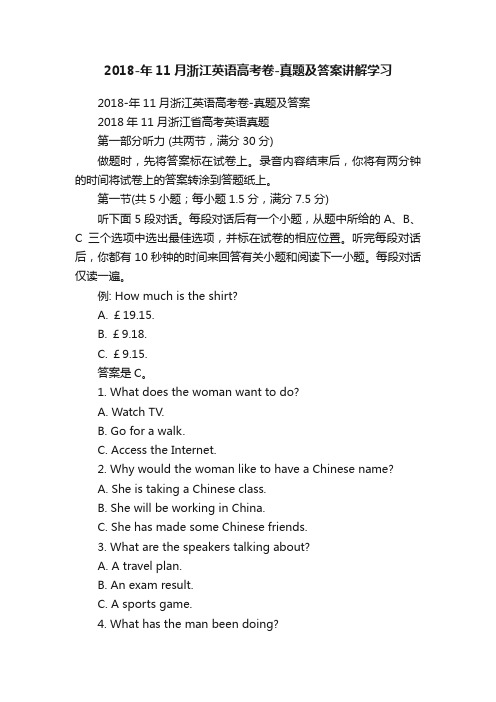
2018-年11月浙江英语高考卷-真题及答案讲解学习2018-年11月浙江英语高考卷-真题及答案2018年11月浙江省高考英语真题第一部分听力 (共两节,满分30分)做题时,先将答案标在试卷上。
录音内容结束后,你将有两分钟的时间将试卷上的答案转涂到答题纸上。
第一节(共5小题;每小题1.5分,满分7.5分)听下面5段对话。
每段对话后有一个小题,从题中所给的A、B、C三个选项中选出最佳选项,并标在试卷的相应位置。
听完每段对话后,你都有10秒钟的时间来回答有关小题和阅读下一小题。
每段对话仅读一遍。
例: How much is the shirt?A. £19.15.B. £9.18.C. £9.15.答案是C。
1. What does the woman want to do?A. Watch TV.B. Go for a walk.C. Access the Internet.2. Why would the woman like to have a Chinese name?A. She is taking a Chinese class.B. She will be working in China.C. She has made some Chinese friends.3. What are the speakers talking about?A. A travel plan.B. An exam result.C. A sports game.4. What has the man been doing?A. Writing something.B. Repairing his pen.C. Shopping.5. What does John suggest the woman do?A. Meet his friend.B. Ask Harry for help.C. Go to the airport with him.第二节(共15小题;每小题1.5分,满分22.5分)听下面5段对话或独白。
2018年度11月浙江高考英语试题标准答案解析及解析
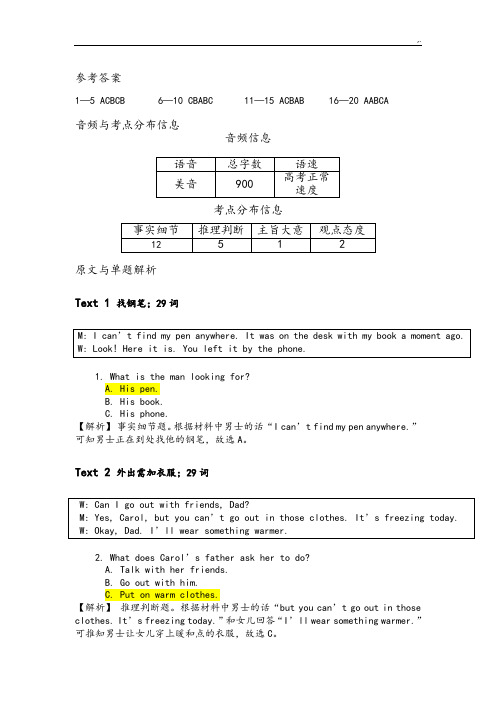
参考答案1—5 ACBCB 6—10 CBABC 11—15 ACBAB 16—20 AABCA音频与考点分布信息音频信息考点分布信息原文与单题解析Text 1 找钢笔;29词1. What is the man looking for?A. His pen.B. His book.C. His phone.【解析】事实细节题。
根据材料中男士的话“I can’t find my pen anywhere.”可知男士正在到处找他的钢笔,故选A。
Text 2 外出需加衣服;29词2. What does Carol’s father ask her to do?A. Talk with her friends.B. Go out with him.C. Put on warm clothes.【解析】推理判断题。
根据材料中男士的话“but you can’t go out in those clothes. It’s freezing today.”和女儿回答“I’ll wear something warmer.”可推知男士让女儿穿上暖和点的衣服,故选C。
Text 3 研究小组的人数;22词3. How many members are there in Alice’s group now?A. Two.B. Four.C. Six.【解析】事实细节题。
根据材料中女士的话“there were six of us to begin with. Then two people left.”可以简单地计算出女士的小组现在有4名成员,故选B。
Text 4 让孩子在厨房帮忙;40词4. What are the speakers talking about?A. Ways of cooking.B. Healthy food for kids.C. Kids helping in the kitchen.【解析】主旨大意题。
2018高考浙江卷英语真题及答案解析
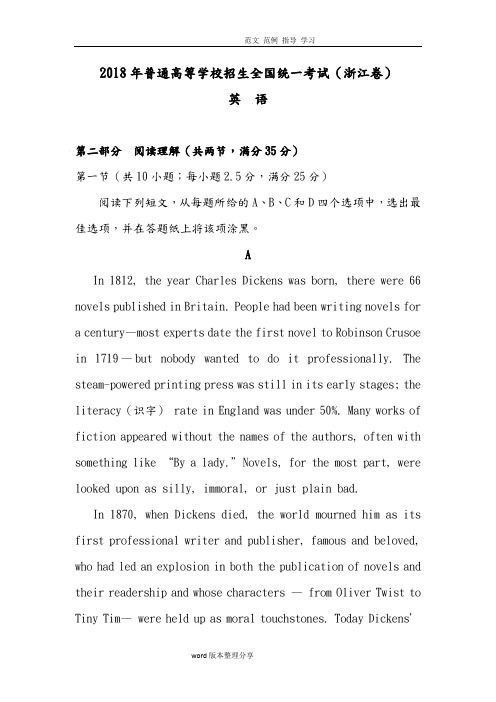
2018年普通高等学校招生全国统一考试(浙江卷)英语第二部分阅读理解(共两节,满分35分)第一节(共10小题;每小题2.5分,满分25分)阅读下列短文,从每题所给的A、B、C和D四个选项中,选出最佳选项,并在答题纸上将该项涂黑。
AIn 1812, the year Charles Dickens was born, there were 66 novels published in Britain. People had been writing novels for a century—most experts date the first novel to Robinson Crusoe in 1719—but nobody wanted to do it professionally. The steam-powered printing press was still in its early stages; the literacy(识字) rate in England was under 50%. Many works of fiction appeared without the names of the authors, often with something like “By a lady.”Novels, for the most part, were looked upon as silly, immoral, or just plain bad.In 1870, when Dickens died, the world mourned him as its first professional writer and publisher, famous and beloved, who had led an explosion in both the publication of novels and their readership and whose characters — from Oliver Twist to Tiny Tim— were held up as moral touchstones. Today Dickens’greatness is unchallenged. Removing him from the pantheon(名人堂) of English literature would make about as much sense as the Louvre selling off the Mona Lisa.How did Dickens get to the top? For all the feelings readers attach to stories, literature is a numbers game, and the test of time is extremely difficult to pass. Some 60,000 novels were published during the Victorian age, from 1837 to1901; today a casual reader might be able to name a half-dozen of them. It’s partly true that Dickens’style of writing attracted audiencesfrom all walks of life. It’s partly that his writings rode a wave of social, political and scientific progress. But it’s also that he rewrote the culture of literature and put himself at the center. No one will ever know what mix of talent, ambition, energy and luck made Dickens such a singular writer. But as the 200th anniversary of his birth approaches, it is possible —and important for our own culture—to understand how he made himself a lasting one.21. Which of the following best describes British novels in the 18th century?A. They were difficult to understand.B. They were popular among the rich.C. They were seen as nearly worthless.D. They were written mostly by women.22. Dickens is compared with the Mona Lisa in the text to stress________.A. his reputation in FranceB. his interest in modern artC. his success in publicationD. his importance in literature23. What is the author’s purpose in writing the text?A. To remember a great writer.B. To introduce an English novel.C. To encourage studies on culture.D. To promote values of the Victorian age.BSteven Stein likes to follow garbage trucks. His strange habit makes sense when you consider that he’s an environmental scientist who studies how to reduce litter, including things that fall off garbage trucks as they drive down the road. What is even more interesting is that one of Stein's jobs is defending an industry behind the plastic shopping bags.Americans use more than 100 billion thin film plastic bagsevery year. So many end up in tree branches or along highways that a growing number of cities do not allow them at checkouts(收银台) . The bags are prohibited in some 90 cities in California, including Los Angeles. Eyeing these headwinds, plastic-bag makers are hiring scientists like Stein to make the case that their products are not as bad for the planet as most people assume.Among the bag makers' argument: many cities with bans still allow shoppers to purchase paper bags, which are easily recycled but require more energy to produce and transport. And while plastic bags may be ugly to look at, they represent a small percentage of all garbage on the ground today.z.x.xk The industry has also taken aim at the product that has appeared as its replacement: reusable shopping bags. The stronger a reusable bag is, the longer its life and the more plastic-bag use it cancels out. However, longer-lasting reusable bags often require more energy to make. One study found that a cotton bag must be used at least 131 times to be better for the planet than plastic.Environmentalists don't dispute(质疑) these points. They hope paper bags will be banned someday too and want shoppers to use the same reusable bags for years.24. What has Steven Stein been hired to do?A. Help increase grocery sales.B. Recycle the waste material.C. Stop things falling off trucks.D. Argue for the use of plastic bags.25. What does the word “headwinds”in paragraph 2 refer to?A. Bans on plastic bags.B. Effects of city development.C. Headaches caused by garbage.D. Plastic bags hung in trees.26. What is a disadvantage of reusable bags according to plastic-bag makers?A. They are quite expensive.B. Replacing them can be difficult.C. They are less strong than plastic bags.D. Producing them requires more energy.27. What is the best title for the text?A. Plastic, Paper or NeitherB. Industry, Pollution and EnvironmentC. Recycle or Throw AwayD. Garbage Collection and Waste ControlCAs cultural symbols go, the American car is quite young. The Model T Ford was built at the Piquette Plant in Michigan a century ago, with the first rolling off the assembly line(装配线) on September 27, 1908. Only eleven cars were produced the next month. But eventually Henry Ford would build fifteen million of them.Modern America was born on the road, behind a wheel. The car shaped some of the most lasting aspects of American culture: the roadside diner, the billboard, the motel, even the hamburger. For most of the last century, the car represented what it meant to be American—going forward at high speed to find new worlds. The road novel, the road movie, these are the most typical American ideas, born of abundant petrol, cheap cars and a never-ending interstate highway system, the largest public works project in history.In 1928 Herbert Hoover imagined an America with “a chicken in every pot and a car in every garage.” Since then, this society has moved onward, never looking back, as the car transformed America from a farm-based society into an industrial power.zxx.kThe cars that drove the American Dream have helped to createa global ecological disaster. In America the demand for oil has grown by 22 percent since 1990.The problems of excessive(过度的)energy consumption, climate change and population growth have been described in a book by the American writer Thomas L. Friedman. He fears the worst, but hopes for the best.Friedman points out that the green economy(经济)is a chance to keep American strength. “The ability to design, build and export green technologies for producing clean water, clean air and healthy and abundant food is going to be the currency of power in the new century.”28. Why is hamburger mentioned in paragraph 2?A. To explain Americans’ love for travelling by car.B. To show the influence of cars on American culture.C. To stress the popularity of fast food with Americans.D. To praise the effectiveness of America’s road system.29. What has the use of cars in America led to?A. Decline of economy.B. Environmental problems.C. A shortage of oil supply.D. A farm-based society.30. What is Friedman’s attitude towards America’s future?A. Ambiguous.B. Doubtful.C. Hopeful.D. Tolerant.第二节(共5小题;每小题2分,满分10分)根据短文内容,从短文后的选项中选出能填入空白处的最佳选项。
- 1、下载文档前请自行甄别文档内容的完整性,平台不提供额外的编辑、内容补充、找答案等附加服务。
- 2、"仅部分预览"的文档,不可在线预览部分如存在完整性等问题,可反馈申请退款(可完整预览的文档不适用该条件!)。
- 3、如文档侵犯您的权益,请联系客服反馈,我们会尽快为您处理(人工客服工作时间:9:00-18:30)。
2018年11月高考英语真题(word版附答案)2018年下半年普通高等学校招生全国统一考试英语本试题卷分选择题和非选择题两部分。
全卷共12页,选择题部分1至9页,非选择题部分10至12页。
满分150分,考试时间120分钟。
考生注意:1.答题前,请务必将自己的、号用黑色字迹的签字笔或钢笔分别填写在试题卷和答题纸规定的位置上。
2.答题时,请按照答题纸上“注意事项”的要求,在答题纸相应的位置上规作答,在本试题卷上的作答一律无效。
选择题部分第一部分听力(共两节,满分30分)做题时,先将答案标在试卷上。
录音容结束后,你将有两分钟的时间将试卷上的答案转涂到答题纸上。
第一节(共5小题;每小题1.5分,满分7.5分)听下面5段对话。
每段对话后有一个小题,从题中所给的A、B、C三个选项中选出最佳选项,并标在试卷的相应位置。
听完每段对话后,你都有10秒钟的时间来回答有关小题和阅读下一小题。
每段对话仅读一遍。
1.What does the woman want to do?A.Watch TV.B.Go for a walk.C.Access the Internet.2.Why would the woman like to have a Chinese name?A.She is taking a Chinese class.B.She will be working in China.C.She has made some Chinese friends.3.What are the speakers talking about?A.A travel plan.B.An exam result.C.A sports game.4.What has the man been doing?A.Writing something.B.Repairing his pen.C.Shopping.5.What does John suggest the woman do?A.Meet his friend.B.Ask Harry for help.C.Go to the airport with him.第二节(共15小题;每小题1.5分,满分22.5分)听下面5段对话或独白。
每段对话或独白后有几个小题,从题中所给的A、B、C三个选项中选出最佳选项,并标在试卷的相应位置。
听每段对话或独白前,你将有时间阅读各个小题,每小题5秒钟;听完后,各小题将给出5秒钟的作答时间。
每段对话或独白读两遍。
听第6段材料,回答第6、7题。
6.Where are the speakers?A.In a bankB.In a hotel.C.In a restaurant.7.How much does the man need to pay?A.$68B.$136C.$204听第7段材料,回答第8至10题。
8.Whose birthday is it?A.Sarah's.B.Michael's.C.Rebecca's.9.When will the birthday party begin?A.At6:15.B.At6:30.C.At7:00.10.What does the man want to know?A.What to buy.B.Who to call.C.Where to park.听第8段材料,回答第11至13题。
11.Why was Julia absent from the class?A.She was ill.B.She got up late.C.She wen to a party.12.What has Robert got for Julia?A.Textbooks.B.oi paintings.C.Lecture notes.13.Where will the speakers meet on Saturday?A.At Robert's home.B.At a barC.At a shop.听第9段材料,回答第14至17题。
14.What is the woman doing?A.Attending a seminar.B.Giving some advice.C.Doing an interview.15.How often does the man travel by bus?A.Twice a day.B.Every other day.C.Once a week.16.How does the man feel about the bus service?A.It's good.B.It's fair.C.It's poor.17.What improvement should the bus company make?A.Buses should be more punctual.B.Drivers should be more polite.C.Seats should be more comfortable.听第10段材料,回答第18至20题。
18.Who is Pierre?A.A doctor from Senegal.B.A university researcher.C.A United Nations official.19.What does Pierre mainly talk about?A.Food supplies in the world.B.The role that the UN plays.C.The purpose of his study.20.What is the expected outcome of Pierre's work?A.A new medicine.B.A new type of rice.C.A new farming method.第二部分阅读理解(共两节,满分35分)第一节(共10小题;每小题2.5分,满分25分)阅读下列短文,从每题所给的A、B、C和D四个选项中,选出最佳选项,并在答题纸上将该项涂黑。
AThe most welcome sight on a cold,wet winter night in London is the familiar shape of a London taxi cab approaching with its yellow "for hire" signshining brightly. That shows it is ready to pick you up. Travelling by taxi in London is not just a way of going from one place to another. It is an experience to be enjoyed and remembered.The main reason for this is the drivers, who are called “cabbies."Many of them are true Cockneys. This means they were born in the heart of London and speak their own special dialect(方言)of English. All of them know every street and famous building in the city, and all of them love to talk. A simple twenty-minute journey across town can become very interesting. You may have a discussion about the government and its leaders or a friendly talk about the driver's Aunty Nellie! One thing is for sure, it will never be boring. Cabbies know all the latest news about film stars, the Royal Family, government leaders, and popular singers or actors and actresses.They also know the best places to eat, shop and relax. And they can take you straight to any large hotel, department store, theatre or museum. They know the shortest way possible without even looking at a map, because everyone who wants to become a taxi driver must pass a very difficult examination in order to get a license to drive a taxi. The exam is called "The Knowledge." It is a written test, and in it drivers are asked the shortest way from one place to another. They must take into account the time of day --in rush hour, a longer route(路线)may be quicker -- and describe the best way. Moreover they must never forget the one-way streets!21.From what can we tell that someone is a Cockney?A.Their interest.B.Their manners.C.Their speech.D.Their appearance.22.What does the author suggest by mentioning "Aunty Nellie”in paragraph 2?A. Passengers are full of curiosity.B. Cabbies' topics are wide-ranging.C. Aunty Nellie is popular in London.D .Londoners are friendly to each other.23.What is the purpose of "The Knowledge"?A.To qualify one todrive a taxi. B.To assess one's driving skills.C.To test drivers' ability to write.D.To check taxi drivers' memory.BThis month millions of American kids can forget about classroom bells and set off for grandparents' homes, sleep-away camps and lifeguard stands. But summer vacation hasn't always been a birthright of U.S. schoolchildren. Before the Civil War, schools operated on one of two calendars(日历), neither of which included a summer vacation. Rural(农村的)schooling was divided into summer and winter terms, leaving kids freeto help with the farm work in the spring planting and fall harvest seasons. Urban students, meanwhile, regularly had as many as 48 weeks of study a year, with one break per quarter.In the 1840s, however, educational reformers like Horace Mann moved to combine the two calendars out of concern that rural schooling was not enough and that overusing of young minds could lead to nervous disorders. Summer appeared as the obvious time for a break: it offered a rest for teachers, fit in the farming calendar and reduced doctors' concern that packing students into hot classrooms would promote the spread of disease.But people's opinion about the modern U.S.school year, which averages 180 days,is still divided. Some experts say its pleasant but lazy summer break, which took hold in the early 20th century, is one of the reasons math skills and graduation rates of U.S. high schoolers ranked well below average in two international education reports published in 2007. Others insist that with children under increasing pressure to devote their downtime to internships(实习)or study, there's still room for an institution that protects the lazy days of childhood.24.What did the rural school calendar before the Civil War allow children to do?A.Enjoy a summer vacation.B.Take a break each quarter.C.Have 48 weeks of study a year.D.Assist their parents with farm work.25.What did the educational reformers do in the 1840s?A.They introduced summer vacation.B.They shortened rural school terms.C.They promoted the study of farming.D.They advocated higher pay for teachers.26.Why are some people unhappy about the modem U.S.school year?A.It pushes the teachers too hard.B.It reduces the quality of education.C.It ignores science instruction.D.It includes no time for internships.CI start every summer with the best of intentions: to attack one big book from the past, a classic that I was supposed to have read when young and ambitious. Often the pairings of books and settings have been purely accidental: "Moby Dick" on a three-day cross-country train trip;“The Magic Mountain"in a New England beachside cottage with no locks on the doors, no telephones or televisions in the rooms, and little to do beyond row on the salt pond. Attempting "The Man Without Qualities" ona return to Hawaii, my native state, however, was less fruitful: I made it through one and a quarter volumes(册),then decided that I'd got the point and went swimming instead.But this summer I find myself at a loss. I'm not quite interested in Balzac, say, or“Tristram Shandy."There's always "War and Peace," which I've covered some distance several times, only to get bogged down in the “War"part,set it aside for a while, and realize that I have to start over from the beginning again, having forgotten everyone's name and social rank. How appealing to simply fall back on a favorite -once mor e into “The Waves”or“Justine,”which feels almost like cheating, too exciting and too much fun to properly belong in serious literature.And then there's Stendhal's "The Red and the Black," which happens to be the name of my favorite cocktail(鸡尾酒)of the summer, created by Michael Cecconi at Savoy and Back Forty. It is easy to drink, and knocking back three or four seems like such a delightful idea. Cecconi's theory:“I take whatever's fresh at the greenmarket and turn it into liquid."The result is a pure shot of afternoon in the park, making one feel cheerful and peaceful all at once, lying on uncut grass with eyes shut, sun beating through the lids..…27.What can we infer about the author from the first paragraph?A.He has a cottage in New England.B.He shows talents for literature.C.He enjoys reading when traveling.D.He admires a lot of great writers.28.What do the underlined words “get bogged down”in paragraph 2 mean?A.Get confused.B.Be carried away.C.Be interrupted.D.Make no progress.29.Why does the author say reading his favorite books feels like cheating?A.He finishes them quickly.B.He should read something serious.C.He barely understands them.D.He has read them many times before.30.What can be a suitable title for the text?A.The Books of SummerB.My Summer HolidaysC.To Read or Not to ReadD.It's Never Too Late to Read第二节(共5小题:每小题2分,满分10分)根据短文容,从短文后的选项中选出能填入空白处的最佳选项。
